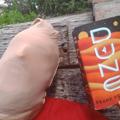Sìne reviewed White Tears Brown Scars by Ruby Hamad
A powerfully argued and detailed survey
5 stars
White Tears / Brown Scars is a powerfully argued and detailed survey of how white women as a group have fought for increased rights and power for themselves, claiming successes for all women, but actually achieving progess more often than not at the expense of women of colour. Hamad looks back through several centuries of oppressive behaviours to prove her point historically and, most importantly, for all protestations to the contrary, demonstrates how little has actually changed below the surface in the twenty-first century. I was fascinated and appalled by her explanations of how women of colour have typically been portrayed as the exact opposite of any era's prevailing white morality in order to devalue them as people, and how white women generally were and still are active in maintaining the idea of white Western culture as a gold standard, bemoaning our position as lesser than white men yet jealously …
White Tears / Brown Scars is a powerfully argued and detailed survey of how white women as a group have fought for increased rights and power for themselves, claiming successes for all women, but actually achieving progess more often than not at the expense of women of colour. Hamad looks back through several centuries of oppressive behaviours to prove her point historically and, most importantly, for all protestations to the contrary, demonstrates how little has actually changed below the surface in the twenty-first century. I was fascinated and appalled by her explanations of how women of colour have typically been portrayed as the exact opposite of any era's prevailing white morality in order to devalue them as people, and how white women generally were and still are active in maintaining the idea of white Western culture as a gold standard, bemoaning our position as lesser than white men yet jealously guarding our 'silver medal' pedestal.
Hamad's words made uncomfortable reading for me, a white British woman. While I don't recall ever having resorted to waterworks myself, I do remember occasions when I felt my hackles rise unjustly at something a woman of colour said or wrote, illogically leaping to the assumption her words were an attack on me personally - just as Hamad illustrates - even when that could obviously not be the intention. I think White Tears / Brown Scars is an important and timely read, perhaps even more so for women such as myself who are trying to make our feminism inclusive, but who aren't aware of this huge ingrained blind spot.


